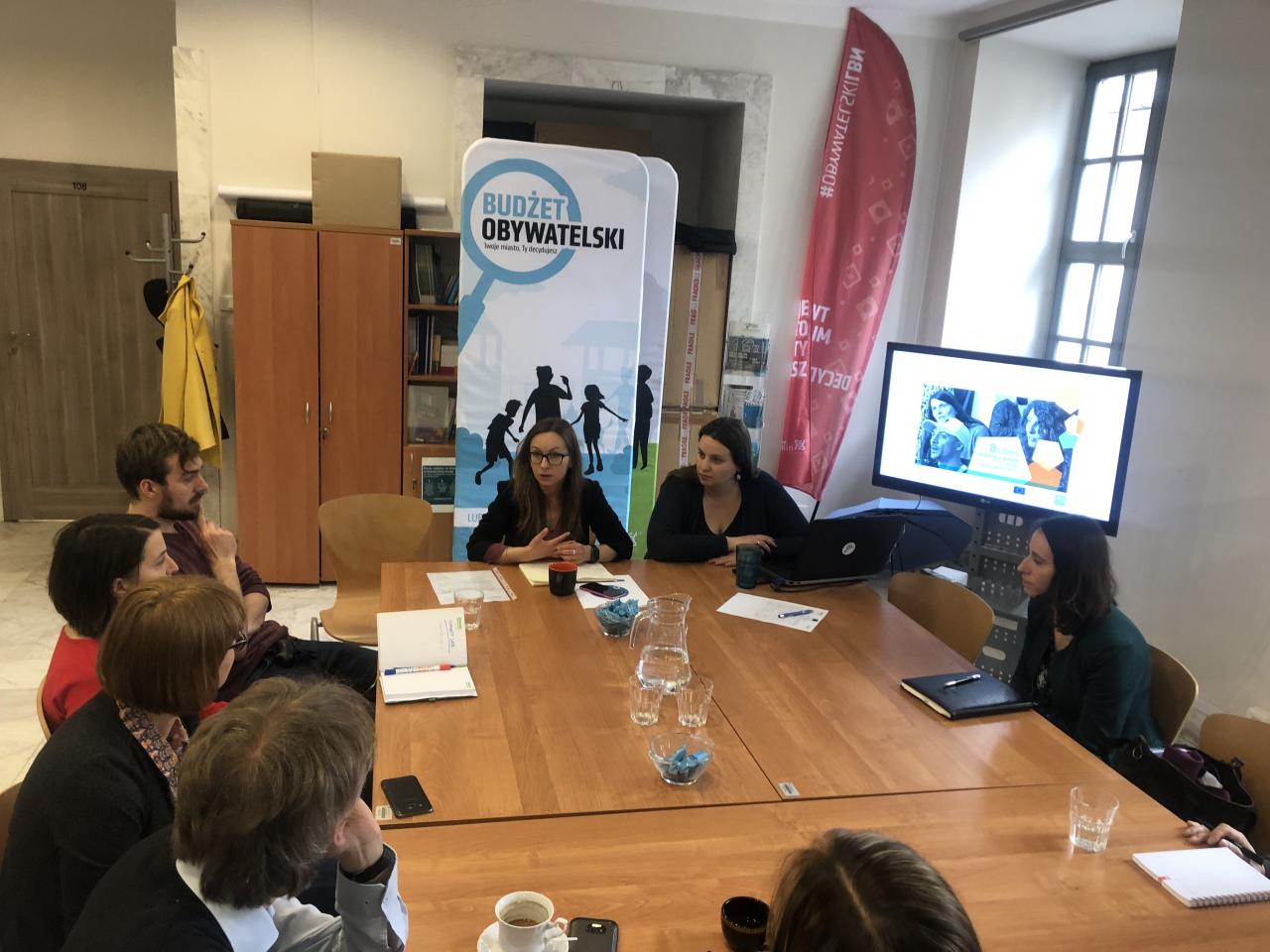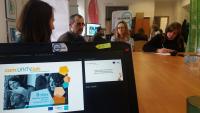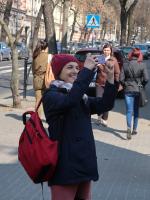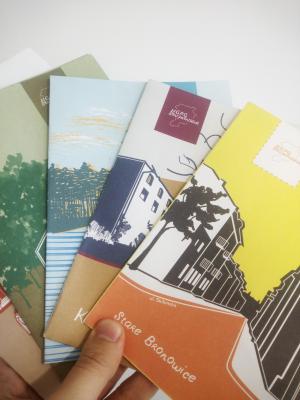
“Mapping, mapping and one more time: mapping!” Data collection, interpretation and use has become one of the most important needs in Lublin. Not only Lisbon Strategy – an URBACT Good Practice to be adapted within the framework of Com.unity.Lab – can help this enchanting eastern city of Poland to develop a more meaningful and integrated ”Lublin 2030 Strategy”, but also the experiences from other cities involved in this Transfer Network… Even local stakeholders like Lubelska Grupa Badawcza (that we interviewed in situ) have a crucial role towards a more participatory city. At least this is the opinion of Anna Szadkowska and Magdelena Gnyp-Scigocka, experts in the Municipality Social Participation Office and coordinators of Com.Unity.Lab in Lublin.
Lublin hosted a Transnational Meeting of Com.Unity.Lab last April. What would you highlight from this meeting?
Definitely the atmosphere and motivation of partners! As many of us underlined many times, the composition of the partnership is perfect – Lisbon, our Lead Partner, managed to gather together a group of fantastic, task oriented city representatives and each meeting becomes more productive than the previous one! The highlight of the meeting were definitely the fruitful discussions we had during each session, each walk and meal we shared together.
What is the Municipality of Lublin learning from this URBACT Transfer Network until now?
Everything! Not only about Lisbon strategy – which, of course, is crucial when it comes to our engagement in the project – but also about examples and experiences of different cities and their effort to adjust the strategy to their local context.
Which tool(s) from Lisbon Local Development toolbox are you interested in adapting to the context of Lublin? Why?
Mapping, mapping and one more time: mapping! Data collection, interpretation and usage has become one of our most important needs here in Lublin. There is just no way to create local policies without the capability to base it on data. As we already know, after the first meeting of ULG, this is the struggle of most people, whether they represent the Municipality or stakeholders.
How are the ULG meetings going? Who is part of your local group and which issues are you addressing?
We have only just started and the approach we have taken is to start small and grow with time and experience. We invited people who we already know are interested in Com.Unity.Lab (from various departments of the Municipality: IT, Strategy and Entrepreneurship, Revitalization, Social Participation Office, Projects) and local stakeholders (NGOs we cooperate with in the field), presented the project, Lisbon strategy and the process that is ahead of us. The feedback of the participants was amazing!

You had recently been at URBACT Campus. What did you bring home from the meeting?
Aside from practical knowledge on the URBACT method? Contacts with other Polish networks and people from different municipalities and civic society organization. Possibility to compare our approaches and learn from others. It was a priceless experience!
During the last transnational meeting Agnieszka Duda - Jastrzębska (Lubelska Grupa Badawcza) was presented as a stakeholder of City of Lublin. Which kind of partnerships did you undertake together?
Agnieszka represents Lubelska Grupa Badawcza (Lublin Research Group), a young NGO that has been very active when it comes to all things related to participation and research. So far we had a pleasure of working together on the Civic Panel, consultation processes within the city and we have just started a huge enterprise – participatory work on Lublin 2030 Strategy.
What does an initiative like the “Sentimental Map” allow the Municipality to learn about (that you did not know)?
Sentimental maps are a great tool to look at district and neighborhoods from a different perspective. Emotional value of space is very much neglected and underrated! Another thing was the process of creating the maps, which involved meeting local residents and engaging them into the conversation. This itself has an identity building value which we, at the Social Participation Office, appreciate very much.
Knowing a Municipality of Lublin’s stakeholder: Lubelska Grupa Badawcza and the “sentimental maps” for a participatory city

During the last Transnational Meeting of Com.Unity.Lab in Lublin we met the sociologist Agnieszka Duda-Jastrzębska, a stakeholder of the municipality. She’s part of Lubelska Grupa Badawcza, a collective with an important mission concerning Participatory Processes in the city. After a walk with the Partners to know some local projects financed by the municipality, she was interviewed in the place where Lublin Food Cooperative works. This space is a result of a partnership between IKEA’s NGO grant scheme and the City of Lublin in order to create a sustainable food hub. Is Lublin a sentimental city? Let’s find out with the help of Agnieszka.
What kind of work is Lubelska Grupa Badawcza doing in Lublin?
We do mainly three types of things: we do “sentimental maps”, identity maps of certain areas of the city… and there’s a lot of areas which really need to be revitalized and I strongly think that the map would be a good thing on the way to revitalize because it shows the identity of the area thought by the locals. Another thing that we do is social research: evaluations, diagnosis, etc. Now we do some bigger things about “outlanders”, people from outside who live here in Lublin – about the culture, their culture needs and participation in culture. The third thing that we do is helping in participation processes. We help the city to maintain good participation processes and we also help the citizens.
How do you approach these citizens in order to take them to participate more in the destiny of the city?
Not staying in our places, not asking them to come [sometimes it’s needed], but working on the streets, walking, talking with people, doing some animations which make people interested and… keep talking, keep talking, keep talking and maybe people [will] trust you.
Which inputs did you receive from the population about their needs, about what they want to see in their city?
Usually there’s a strong need to have places to meet. In many areas of the city there are no areas where people can really meet, sit, drink coffee and talk. Another common need is green spaces in our surroundings, but actually I think many people need to be seen, to be listened. They want to speak with someone and to have the right, the possibility of making their own input into the decisions for the city. They need to be listened.
How do you evaluate the impact of these social and cultural projects in the city?
We do social research, sociological research, mostly qualitative. So, we interview, we do small interviews with people, talk with them on the streets, we do some kind of workshops. Sometimes when we do the maps, we meet classes or groups. Sometimes we have the possibility of doing quantitative research.
Which inputs do you give to the municipality after the evaluation process and the participatory approach?
Our inputs’ impact is quite small, because this is only the map. We chose the main points, points that are really important for the citizens and of course we try to say what places are, we put some quotes from the people, why the places are important for them and we try to put which needs are strong. Once this product is very small, we don’t have the opportunity to have a big impact. We would love to go in depth in this research. We feel that the people need it…
Watch the complete video interview in Com.Unity.Lab Youtube Channel.

